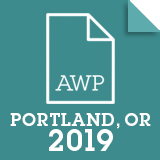Panel Participants: LaTanya McQueen, Randon Billings Noble, Grace Talusan, Rebecca Fish Ewan, Melissa Grunow
 Description: Authors whose work is widely and wildly diverse will read from and discuss their recently published creative nonfiction. All include an uncovering of the hidden or lost, but the contents range from a Filipino American experience; different kinds of hauntedness; the search for an ancestor, once a slave, whose life became a prism of the author’s own experience; the intersection of disability, queerness and desire; and a story about a 1970s kid’s commune told through drawings and free verse.
Description: Authors whose work is widely and wildly diverse will read from and discuss their recently published creative nonfiction. All include an uncovering of the hidden or lost, but the contents range from a Filipino American experience; different kinds of hauntedness; the search for an ancestor, once a slave, whose life became a prism of the author’s own experience; the intersection of disability, queerness and desire; and a story about a 1970s kid’s commune told through drawings and free verse.
Rebecca Fish Ewan: Rebecca interprets “silences” as dark or scary places and she chose to read from the “Dark Matters” chapter of her book that she had never read in public before. She showed us that the pages have what’s called a full bleed, meaning that the dark ink shows on the book edges when you turn it sideways. Her memoir in cartoons and free verse By the Forces of Gravity is the story of a twelve year old girl growing up in Berkeley in the early 70s. Rebecca read a poem where the narrator is hungry for pea soup and she has to trade with a drifter to get some.
Randon Billings Noble: Randon understands “silence” as quiet and stillness. She read excerpts from an essay on silence where she described being silent in various settings. When alone with ten Rothko paintings for company, she said “I like that his paintings could not be translated into words.” When silent in the library, she said that despite the quiet, there was an “audible energy.” The third section was about the silence of a monastery at 3am where Randon was a retreatant (I had to look that word up, and it means – as you might guess – person attending a retreat.) Randon has new essay collection out, Be With Me Always, and is the founder of the quarterly literary magazine After the Art.
Melissa Grunow: Melissa frames “silence” as discomfort. She read from her new essay collection I Don’t Belong Here. The story was a “Field Guide” about how to feign sanity in a waiting room while waiting for mental health services. My favourite part was when she said that where you sit in the room will say more about you than the diagnosis on your page. For example, if you get up and change seats multiple times, you probably have ADD, and so on. She also described a character by saying “Her voice will crawl further up your nose each time.”
Grace Talusan: Grace explains “silence” as not speaking up, not saying what is on your mind. Grace told us that this was her first time reading from the finished copy of her book The Body Papers which was exciting both for her and for us in the audience. She read a story about the foods she was used to eating with her family compared to the foods she would have at friends’ houses. At a certain point, she realized that that “langua” was cow tongue and she pretended not to like it, imagining that her white friends were watching her. She said “Every time I left the house, I crossed a border.”
LaTanya McQueen: LaTanya looks at “silence” as a feeling – sort of despair mixed with hope and rage – that she experienced when visiting the Smithsonian National Museum of African American History and Culture in Washington, D.C. “I am thinking about all we risked and all we lost,” she said. She read from her essay, A Plumb, Falling, which braids together various ancient tools such as a plumb line with her experience travelling through time at the museum. A plumb line is a rock tied to a stick with a piece of string. When you hold it up, the rock will drop straight down, so you can use it to measure a vertical straight line and see what you have built. You see how far you’ve come and then you know how far you have to go.
Amy Fish is the author of I Wanted Fries with That: How to Ask for What You Want and Get What You Need (New World Library 2019). She has won prizes from Writer’s Digest and the Quebec Anglophone Heritage Network and is a book reviewer for Hippocampus Magazine.